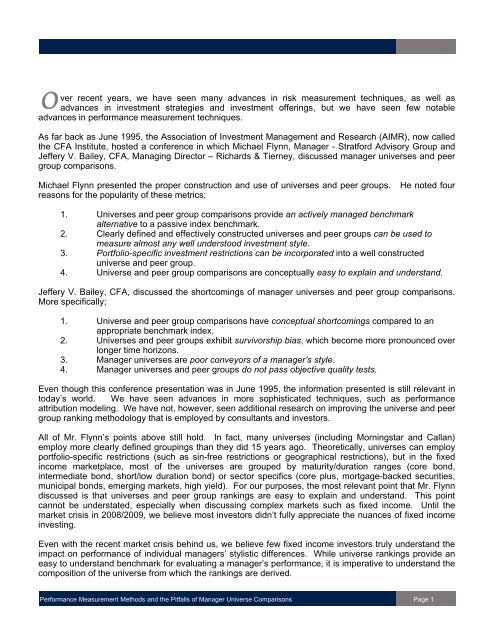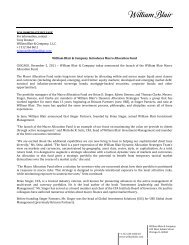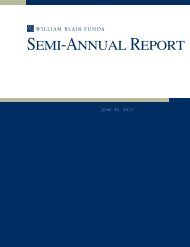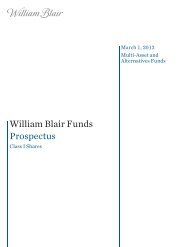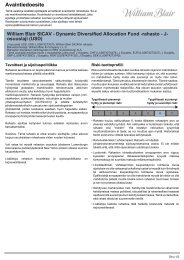Performance Measurement Methods and the Pitfalls ... - William Blair
Performance Measurement Methods and the Pitfalls ... - William Blair
Performance Measurement Methods and the Pitfalls ... - William Blair
Create successful ePaper yourself
Turn your PDF publications into a flip-book with our unique Google optimized e-Paper software.
ver recent years, we have seen many advances in risk measurement techniques, as well as<br />
O advances in investment strategies <strong>and</strong> investment offerings, but we have seen few notable<br />
advances in performance measurement techniques.<br />
As far back as June 1995, <strong>the</strong> Association of Investment Management <strong>and</strong> Research (AIMR), now called<br />
<strong>the</strong> CFA Institute, hosted a conference in which Michael Flynn, Manager - Stratford Advisory Group <strong>and</strong><br />
Jeffery V. Bailey, CFA, Managing Director – Richards & Tierney, discussed manager universes <strong>and</strong> peer<br />
group comparisons.<br />
Michael Flynn presented <strong>the</strong> proper construction <strong>and</strong> use of universes <strong>and</strong> peer groups.<br />
reasons for <strong>the</strong> popularity of <strong>the</strong>se metrics;<br />
He noted four<br />
1. Universes <strong>and</strong> peer group comparisons provide an actively managed benchmark<br />
alternative to a passive index benchmark.<br />
2. Clearly defined <strong>and</strong> effectively constructed universes <strong>and</strong> peer groups can be used to<br />
measure almost any well understood investment style.<br />
3. Portfolio-specific investment restrictions can be incorporated into a well constructed<br />
universe <strong>and</strong> peer group.<br />
4. Universe <strong>and</strong> peer group comparisons are conceptually easy to explain <strong>and</strong> underst<strong>and</strong>.<br />
Jeffery V. Bailey, CFA, discussed <strong>the</strong> shortcomings of manager universes <strong>and</strong> peer group comparisons.<br />
More specifically;<br />
1. Universe <strong>and</strong> peer group comparisons have conceptual shortcomings compared to an<br />
appropriate benchmark index.<br />
2. Universes <strong>and</strong> peer groups exhibit survivorship bias, which become more pronounced over<br />
longer time horizons.<br />
3. Manager universes are poor conveyors of a manager’s style.<br />
4. Manager universes <strong>and</strong> peer groups do not pass objective quality tests.<br />
Even though this conference presentation was in June 1995, <strong>the</strong> information presented is still relevant in<br />
today’s world. We have seen advances in more sophisticated techniques, such as performance<br />
attribution modeling. We have not, however, seen additional research on improving <strong>the</strong> universe <strong>and</strong> peer<br />
group ranking methodology that is employed by consultants <strong>and</strong> investors.<br />
All of Mr. Flynn’s points above still hold. In fact, many universes (including Morningstar <strong>and</strong> Callan)<br />
employ more clearly defined groupings than <strong>the</strong>y did 15 years ago. Theoretically, universes can employ<br />
portfolio-specific restrictions (such as sin-free restrictions or geographical restrictions), but in <strong>the</strong> fixed<br />
income marketplace, most of <strong>the</strong> universes are grouped by maturity/duration ranges (core bond,<br />
intermediate bond, short/low duration bond) or sector specifics (core plus, mortgage-backed securities,<br />
municipal bonds, emerging markets, high yield). For our purposes, <strong>the</strong> most relevant point that Mr. Flynn<br />
discussed is that universes <strong>and</strong> peer group rankings are easy to explain <strong>and</strong> underst<strong>and</strong>. This point<br />
cannot be understated, especially when discussing complex markets such as fixed income. Until <strong>the</strong><br />
market crisis in 2008/2009, we believe most investors didn’t fully appreciate <strong>the</strong> nuances of fixed income<br />
investing.<br />
Even with <strong>the</strong> recent market crisis behind us, we believe few fixed income investors truly underst<strong>and</strong> <strong>the</strong><br />
impact on performance of individual managers’ stylistic differences. While universe rankings provide an<br />
easy to underst<strong>and</strong> benchmark for evaluating a manager’s performance, it is imperative to underst<strong>and</strong> <strong>the</strong><br />
composition of <strong>the</strong> universe from which <strong>the</strong> rankings are derived.<br />
<strong>Performance</strong> <strong>Measurement</strong> <strong>Methods</strong> <strong>and</strong> <strong>the</strong> <strong>Pitfalls</strong> of Manager Universe Comparisons Page 1


